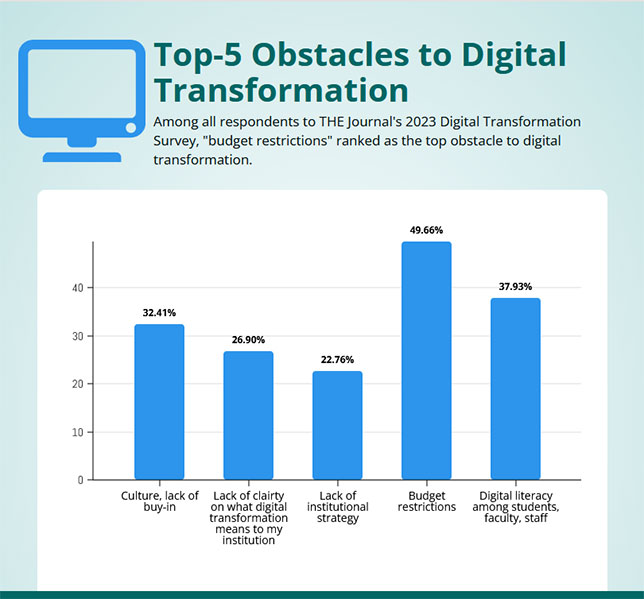Budget Restrictions, Culture, and Digital Literacy Top Obstacles for Digital Transformation
Even with the massive influx of technology spending in K–12 over the last few years, digital transformation in schools continues to be a work in progress.
Among the obstacles cited by technology leaders and staff, along with administrators and faculty, the top obstacle to digital transformation at their institutions is budget restrictions, cited by about half (49.66%) of all respondents to the 2023 THE Journal Digital Transformation Survey. Other top obstacles included digital literacy among students, faculty, and staff (37.93%); institutional culture and lack of buy-in (32.41%); lack of clarity on what digital transformation means to the respondents' institution (22.9%); and lack of institutional strategy (22.76%).

Looking only at responses from K–12 IT leaders, the perception of the top obstacles varied significantly from the overall responses. Two responses tied for first place: institutional culture and lack of buy-in (50%) and lack of digital literacy among students, faculty, and staff (50%). Other top obstacles cited by IT leaders included: organizational silos (39.47%); budget restrictions (28.95%); and lack of institutional strategy (26.32%).
Administrative leaders (non-IT) had a different perspective. Budget restrictions was by far the top response, at 66.67%, followed by security and privacy concerns (38.89%); digital literacy (33.33%); lack of clarity (33.33%); and IT infrastructure (27.78%).
The Digital Transformation Survey was conducted by THE Journal from March 2023 to June 2023 and included 237 responses from schools and districts around the country. Among respondents, 84.39% were from public institutions, with 21.1% at the district level, and the remainder in combined K–12 institutions (15.61%), high school (25.32%), combined secondary (3.38%), middle school (10.13%), elementary school (16.88%), and the remainder in PreK, alternative, or other types of institutions, such as combined K–8.